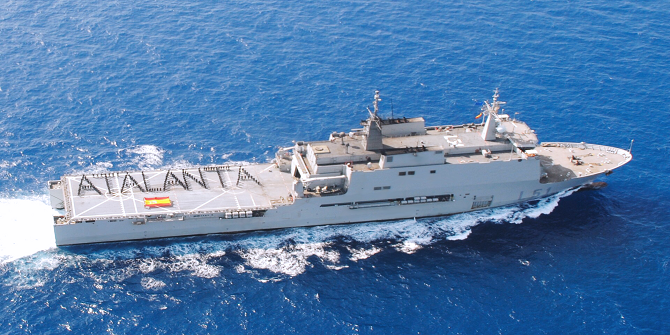
Somalia is a sad illustration of how Brexit is tangibly reducing British influence internationally. The general rule of thumb for EU policy in Africa has been that it is determined one third by France, one third by the UK and one third by the rest. This gave the UK disproportionate influence. The UK has taken the lead on the European policy towards Somalia, making it the flagship of British policy in Africa. But its influence has depended heavily on the EU.
EU naval force patrolling the Somalia coast, Operation Atalanta
The UK has had the lead in Europe’s Naval Force Operation Atalanta (EUNAVFOR) against piracy in Somalia. In June, the EU’s Political and Security Committee transferred command and oversight responsibilities from Britain to Spain and France. The decision was confirmed by the EU Council in July. Spanish vice admiral Antonio Martorell Lacave will take over from Gen. Charlie Stickland as the commander of the operation on 29 March 2019. The command HQ in Northwood (UK) will be relocated to Rota (Spain), except for the Maritime Security Centre-Horn of Africa (MSCHOA), which will be located in Brest (France).
EU financing for AMISOM
The EU has provided over 1.6bn euros to the African Union Mission in Somalia (AMISOM) since 2007, which is only one component of its overall security and development engagement in Somalia; this includes three missions: the EU Naval Force Operation Atalanta (EU NAVFOR); the EU military training mission in Somalia (EUTM Somalia), and the EU civilian maritime security capacity-building mission (EUCAP Nestor).
AMISOM is the crucial element in the Somali security arena. There is currently a plan to scale it down but this decision is driven by necessity rather than strategy. The three-year timeframe (2018-2020) to steadily hand over military and security responsibility to the Somalia National Army and Police Force was seen as far too short by most analysts. Key in making a successful transition is the need to ensure AMISOM has sufficient resources and capacity to seriously degrade Al Shabaab’s presence, as well as to ensure Somalia has developed its own capable, legitimate and inclusive security and policing forces. Amongst many other factors this requires a strong working relationship between the Federal Government of Somalia and the Federal Member States. Most of these factors are not in place and it remains to be seen whether the recent Garowe communique, which signals the intent of the Member States to develop a more integrated intelligence and security plan, results in significant developments in this area.
Currently the EU funds 80 percent of AMISOM costs through its Africa Peace Facility (APF). (Until 2017 it was 90 percent.) This is by far the largest allocation of EU APF funds. Following Brexit this cannot be sustained. First, the APF will be reduced because of the loss of the UK’s contribution. The APF does not actually permit funding of offensive military operations as such, which includes those that AMISOM routinely conducts, so a formula has been found whereby a certain proportion of the APF is allocated to overhead and miscellaneous expenses, which then goes for funding such operations. This margin will disappear with the UK’s vanishing act. Second, the disproportionate share of APF funding going to Somalia (rather than to French security priorities in the Sahel, Central African Republic and elsewhere) is possible insofar as the UK has a leading role within the EU. Therefore, after March, it seems that the UK will be left holding the pen for Somali at the UN Security Council and possibly continuing to host Somali conferences in London, but insofar as any security is to be provided by international forces, the Foreign Secretary will have to go begging for leftovers in Brussels.
Note: The CRP blogs gives the views of the author, not the position of the Conflict Research Programme, the London School of Economics and Political Science, or the UK Government.



